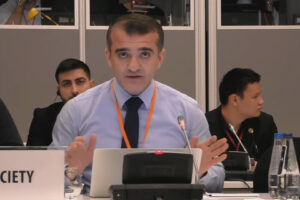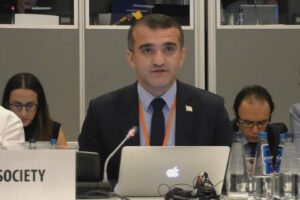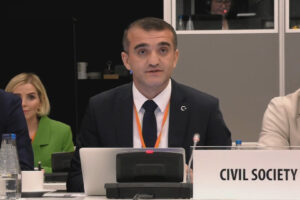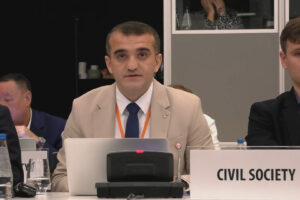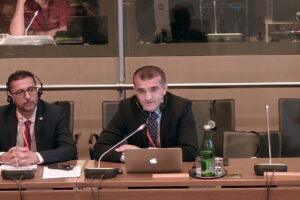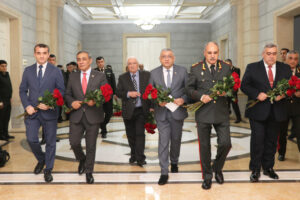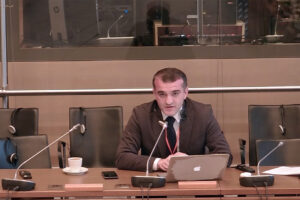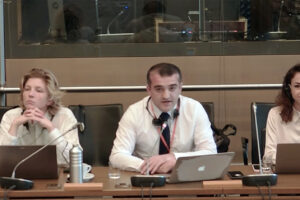Catherine Cosman: Religious freedom conditions in Azerbaijan deteriorated over the past few years


Azerbaijan has long presented itself as a model of religious tolerance. President Ilham Aliyev twitted last year that everyone “can see on the example of Azerbaijan how religious and ethnic relations are regulated”. In the meantime, the latest Annual Reportof the US Commission on International Religious Freedom (USCIRF), an independent federal advisory body that was created to monitor religious freedom abuses abroad, detailed 51 cases of religious prisoners in Azerbaijan. It also placed the country on2014 “Tier 2” list, along with countries like Afghanistan, Cuba, Kazakhstan, etc.TURAN’s Washington, DC correspondent interviewed USCIRF’s Senior Policy Analyst Catherine Cosman regarding current religious situation in Azerbaijan.
Q. How would you highlight the current major concerns on religious freedoms in Azerbaijan?
A. Despite the Azerbaijani government’s claims of official tolerance, religious freedom conditions in that country deteriorated over the past few years. From April 2013 until April 2014, religious organizations were closed and non-violent religious activity was punished with detentions, fines and other penalties. Azerbaijan’s government applied the repressive religion law adopted in 2009 that curtails a range of religious activities. Penalties were increased for religion law violations in 2010 and 2011. Unregistered religious activity is illegal and the activities of registered groups are tightly regulated.Azerbaijan’s religion law was amended 14 times since it was first adopted in 1992, with major restrictions adopted in secret. The law is used to limit religious freedoms and to justify police raids, detentions, and fines. The law’s numerous problematic provisions include: compulsory and complex state registration; religious activities limited to a community’s registered address and not in private homes or in public; an elaborate system of government censorship of religious materials combined with official permits to produce, import, export and disseminate such materials; and government-approved religious education is needed to preach or teach religion. In spring 2014, Azerbaijan’s parliament adopted further restrictive amendments to the religion, NGO, and other laws, purportedly to prevent the spread of religious extremism and of foreign missionary organizations through additional financial reporting requirements.
Violations of the religion law that are subject to administrative fines include failing to register with the state; holding religious meetings or ceremonies without state approval; and holding religious activity outside a religious association’s registered address;.In 2010, these fines were increased 16-fold from 2009.: Violations of legal requirements that children be barred from religious education are subject to criminal penalties with possible 2-year jail terms. In late 2011 the Administrative Code dramatically increased fines for such “offenses.”
Further Restrictions Against Muslims
Muslims are subject to further restrictions which do not apply to other faiths: all Muslim religious leaders are named by the state-backed Caucasus Muslim Board and are limited to Azeri citizens educated in Azerbaijan; all mosques must submit written reports to, the Caucasus Muslim Board. Under a 2008 unpublished government order, prayer is not allowed outside of mosques; police enforced this ban. In 2010, the Ministry of Education introduced a standard school uniform that banned the Islamic headscarf, resulting in a mass petition campaign and large public protests that led to 72 arrests after a demonstration in October 2012. In the spring of 2014, the headscarf ban was extended to university students. In October 2012, the Council of Europe’s Venice Commission and the Organization for Security and Co-operation in Europe (OSCE) issued a joint legal opinion that Azerbaijan’s religion law failed to meet the country’s international human rights commitments. The government did not address the identified shortcomings and the highlighted problems remain.
Since 2009, Azerbaijan has closed or destroyed numerous houses of worship, mainly Sunni mosques, despite protests by local Muslim communities. Other religious minority communities, such as the Baptists in Baku, are also seeking the return of their historic places of worship.
Residents of the Nakhichevan exclave encounter more severe religious freedom restrictions than in Azerbaijan’s other regions.
Registration Hardships for Religious Groups
Religious groups in Azerbaijan have been required to re-register five times since the 1992 religion law. The registration process is mandatory and groups, which are denied registration or refuse on theological grounds, are considered “illegal.” Any activity of registered religious organizations can only occur at the community’s legal address. All independent mosques outside the framework of the state-backed Caucasian Muslim Board have failed to obtain registration, as well as some of the Board’s own mosques. Also without legal status are almost all Protestant denominations (including Baptists, Seventh-day Adventists and Pentecostals), as well as Jehovah’s Witnesses.
Unregistered religious communities face raids and other penalties. In January 2012, a group of Muslims were ordered to close an unregistered prayer room in Baku. In March 2012 in Turan village in northern Azerbaijan, police raided the home of a reader of Turkish theologian Said Nursi and confiscated tests. In May 2012, police raided the Baku home of a Muslim that resulted in the detention of many of the Muslim’s friends and the confiscation of the Qur’an. In November 2012, police raided the homes of two former Baptist prisoners of conscience in the town of Aliabad in the Zakatala region and confiscated New Testaments. Jehovah’s Witnesses have been the victims of numerous police raids since 2007 and have filed five separate cases at the ECtHR.
The religion law and administrative code bans on undefined “religious propaganda” by foreigners have led to deportations of some Muslims, Protestants and Jehovah’s Witnesses. State permission is required to produce, import, export, and distribute religious material. Religious material cannot be sold outside officially-approved locations. Penalties for first time offenders include heavy fines or up to two years’ imprisonment. Azerbaijan is the only Council of Europe (CoE) member state to impose a system of compulsory censorship of religious and other literature.
The government has confiscated religious materials at the country’s borders. In 2012, police raided the homes of members of numerous religious communities, including Muslims, Adventists, Baptists and Jehovah’s Witnesses. Reportedly, the Georgian Orthodox Church, and many Muslim groups can more easily get permits for literature..Jehovah’s Witnesses have appealed through the Azeri courts to challenge the SCWRA’s censorship rights. In May 2014, Forum 18 reported on an Azerbaijani “banned” books list; most are Islamic texts such as the 14-volume Risale-iNur (Messages of Light) by Said Nursi, the Turkish Muslim theologian. Apparently, police compiled the list based on State Committee for Work with Religious Organizations “expert analyses.” Police have long confiscated texts on this list during raids on private homes and private religious meetings. The list includes “Holy Book – Old Testament,” two Jehovah’s Witness publications. The list was published by the Baku-based APA news agency on May 5, three days after President Ilham Aliyev abruptly dismissed Elshad Iskenderov as Director of the State Committee for Work with Religious Organizations but is not known to have been published by a state agency.
Religious Prisoners…
The Human Rights Center of Azerbaijan (HRCA), a non-governmental organization, has compiled a list of 220 Azeris convicted between 2005 and 2011 for alleged religious extremism, including Shi’i and Wahhabi Muslims. According to the HRCA, three people were sentenced due to their religious views: Jehohah’s Witness and conscientious objector Fakhraddin Mirzayev and two Muslims, Nurani Mammadov and Rufat Nuriyev, who protested the school headscarf ban. All three are scheduled for release from prison in 2013.
In January 2013, a rapporteur of the Parliamentary Assembly of the Council of Europe (PACE) issued his final human rights report on Azerbaijan including a list of political prisoners. Of these cases, 23 individuals have been convicted in Azerbaijan for alleged membership in Islamist groups, organizations and political parties. In the spring of 2014, Azerbaijan’s Supreme Court rejected an appeal by Movsum Samedov, one of the 23 individuals highlighted by PACE. He was arrested in January 2011, after denouncing Azeri officials for the headscarf ban, and was sentenced to 10-12 years in jail in October 2011 on security-related charges. Reportedly he will file a challenge in the ECtHR.
While the Azerbaijan Constitution allows alternative military service, other laws subject those who refuse military service to a prison term of up to two years. Despite Azerbaijan’s CoE membership since 2001 and its promises to allow alternative service in line with CoE standards, the government penalizes conscientious objectors. In July 2011, the ECtHR 1 recognized the right to conscientious objection to military service as a right protected under international standards of freedom of religion or belief.
http://www.uscirf.gov/sites/default/files/Azerbaijan%202014_0.pdf This link is to the full text of USCIRF’sAzerbaijan chapter and to an annex on 51 religious prisoners in Azerbaijan sentenced since August 2011. This information is included in the US Commission on International Religious Freedom’s Annual Report issued on April 30, 2014. The religious prisoners cases are primarily drawn from the Azerbaijan Legal Protection and Awareness Public Union with some additional case data from the Azerbaijan Institute for Peace and Democracy. Of Muslims imprisoned for the non-violent practice of their religion, 31 were arrested for participating in the October 2012 protest against the official hijab (headscarf) ban; ten people, including journalist Nijat Aliyev, were arrested for their alleged connection to the Muslim website www.azad.xeber.az that campaigned against the arrests of religious believers; six Muslims arrested in the Masalli region along with journalist Araz Guliyev, editor of www.xeber44.com, that is critical of Azerbaijan’s policies on religion ;the Muslim theologian Tale Kamil Bagirov (also known as Taleh Bagirzadeh)was sentenced to a three-year term on drug charges after his mosque speech which was critical of the Azerbaijan government’s policies on religion and the illegal arrests of believers; Muslim teacher Abdul Neymat Suleymanov who founded the National-moral Values Public Union and who also was a leader of hijab ban protests, was sentenced in 2011 to an 11-year term for inciting enmity against Azerbaijan and mass unrest.
Risk of Radicalizing Religious Communities
Q.There are some concerns among local experts on Azerbaijani governments’ “control” of religious extremism in the country, as the religious incidents mostly seem to take place after Western criticism of the country’s poor human rights records… While Azeri officials claim that religious movements are infiltrating Azerbaijan and are trying to create radical networks, independent analysts believe that it’s the Azeri authorities pressure on the believers to demonstrate the West that there is a real religious threat… Would that be the case, you think, and how does the religious extremism in countries with poor human rights records concern the western democracy?
A. Religious communities in Azerbaijan, particularly Muslims, labor under a draconian religion law adopted in 2009. The highly restrictive laws and other official policies adopted in recent years by the Azerbaijani government run the risk of radicalizing local religious and other communities much more than foreign influences.
Western governments should show more active concern about freedom of religion or belief and other human rights in various countries. All too often, when governments pass unjust laws and adopt repressive policies in an attempt to regulate non-violent domestic religious and other communities, these harsh laws and policies may stimulate the development of violent radicalism. In other words, harsh laws that do not allow people to express their religious – or non-religious – views, also should be viewed as part of a wider political context. In particular, many governments place unfair limits especially on the majority religion because the authorities view such majority communities as potential sources for mass mobilization for political opposition.
Q. There are a number of Azerbaijani citizens that are reportedly fighting in Afghanistan, Pakistan, Iraq and even Syria. What do these facts tell you about the radical Islam in Azerbaijan?
A. As in many countries, there are some radical Islamists in Azerbaijan, but the government has not found effective ways of dealing with that problem: laws should punish actual violence, not ideas or peaceful religious practice.
Sectarian Tension?
Q. Last year’s Pew poll on Sunni-Shia tensions in Azerbaijan, found that few Muslims see sectarian conflict as a major problem. How does the situation look like today? Most recently in Sumgayit, a gunfight was recorded between religious groups “Khawarij” and “Salafi” due to religious differences…
A. My impression is that attitudes on differences between Shi’a and Sunni Islam may be part of a generational change underway in Azerbaijan and other post-Soviet states. The older generation grew up under official Soviet atheism and people of this generation may have encountered underground Islam but it did not understand Sunni and Shi’a Islam divergences. The younger generation, particularly those who studied in the Mideast, may have a better formal Muslim education and may give greater importance to distinction between Sunni and Shi’a Islam.
The Azerbaijani authorities arrested seven people alleged to have been responsible for a December 2013 violent confrontation between certain members of local “Khawarij” and Sunni “Salafi” groups. In a more recent violent incident several Shi’a forcibly shaved the beard of a Sunni man from an alleged Wahhabi group in the town of Sabirabad, near Baku. A video of the attack was briefly posted on YouTube on July 4. Police investigated the incident and religious officials condemned it, but an apparent retaliatory attack was reported on July 5, Wahhabi men beat several Shi’a believers during an iftar meal. “This is the tragedy of a man, who, after the Soviet period, is not allowed to live his faith and to proselytize,” said imam IlgarI brahimoglu commenting on this incident. “This is the tragedy of an Azerbaijani man who goes from one extreme to another.”
The situation in Azerbaijan may be particularly delicate: it is the only post-Soviet country with a Shi’a majority, but still has a significant Sunni minority of 35 percent. These percentages among Azerbaijan’s Muslims may also reflect Iranian (Shi’a) and Turkish (Sunni) influences. Religious diversity is a source of strength but it also requires fair and skillful government policies, which sadly is not the case in today’s Azerbaijan.
Q. There are also some concerns on Islam’s role and participation in the politics in Azerbaijan, as a religious leader, one of the most popular critics of Aliyev government was sentenced for 2 years in jail on possession of narcotic charge that many believe is spurious… Many members of the Islamic Party were supporting the oppositional candidate during last presidential election, while in the meantime, we witnessed some religious leaders speak out in support of Aliyev’s candidacy for a 3rd term. Where do you think this tendency takes the country in near future and how the Azeris should react to this topic?
A. It is natural that in Azerbaijan, just as in any other country, members of any religious or other community express diverse opinions on political and other matters of public interest. Of course, it is also essential that governments allow the expression of diverse opinions as long as they do not advocate imminent violence. Unfortunately, the Azerbaijan government has shown that it has little tolerance – let alone respect — for those who express diverse points of view; it only seems to tolerate those who support official policies and state authorities.
Gulen Movement Controversy
Q. Speaking about Islam and politics, there are rumors that Turkey’s Gulen movement controversy is spilling over to Azerbaijan. How do you think this will affect the religious challenges in the region?
A. According to Bayram Balci, Visiting Scholar for Middle East Studies at the Carnegie Endowment for International Peace, “Islam as promoted by Gülen is a synthesis of mystical Islam, Turkish nationalism, modern humanism, and civic service. But it is not clear whether the movement’s influence can even be characterized as “religious,” or for that matter, as Islamist.” Gülen schools have trained hundreds of students in Azerbaijan and some graduates have taken up key positions in government, academia and the private sector. Balci notes that in his discussions with dozens of graduates of Gülen schools, he has seen that they tend to be “well-educated and well-integrated in their society,” with good jobs and usually cosmopolitan in outlook. Their religious attitudes and practices, however, are diverse. But, as Balci points out, “the eruption at the end of 2013 of a still ongoing political feud inside [Turkry’e Justice and Development Party] AKP between elements aligned with Erdoğan and others aligned with Gülen has rein- forced suspicions in the Caucasus… that the movement does, in fact, have a political agenda.”
In June 2014, a decision was made to close all Gulen schools in Azerbaijan, allegedly due to their high costs, according to a statement from the State Oil Company of Azerbaijan (SOCAR), which in the past year has acquired schools owned by the Gülen Movement. This decision was confirmed by the Azerbaijani International Education Center. In May 2014, It is unfortunate that the official decision to close the Gulen schools in Azerbaijan means that people can no longer benefit from the educational opportunities provided by the Gulen educational system. Hopefully, this unfortunate decision will not have wider negative implications for Azerbaijan’s Sunni minority.
Elshad Iskenderov, Director of the State Committee for Work with Religious Organizations was suddenly fired, according to Forum 18; reportedly, his name was second on a list of senior Azerbaijani officials of followers of the US-based Turkish imam Fethullah Gulen. Allegedly, during his April 2014 visit to Baku Turkish Prime Minister Recep Tayyip Erdogan gave that list to Azerbaijan President Aliyev.. (Erdogan is currently in a power struggle against alleged Gulenists who had been key political allies.) Aliyev has not yet named a successor to Iskenderov.
Alakbar Raufoglu
Washington, DC
Catherine Cosman: Religious freedom conditions in Azerbaijan deteriorated over the past few years
 21 July 2014
21 July 2014

Azerbaijan has long presented itself as a model of religious tolerance. President Ilham Aliyev twitted last year that everyone “can see on the example of Azerbaijan how religious and ethnic relations are regulated”. In the meantime, the latest Annual Reportof the US Commission on International Religious Freedom (USCIRF), an independent federal advisory body that was created to monitor religious freedom abuses abroad, detailed 51 cases of religious prisoners in Azerbaijan. It also placed the country on2014 “Tier 2” list, along with countries like Afghanistan, Cuba, Kazakhstan, etc.TURAN’s Washington, DC correspondent interviewed USCIRF’s Senior Policy Analyst Catherine Cosman regarding current religious situation in Azerbaijan.
Q. How would you highlight the current major concerns on religious freedoms in Azerbaijan?
A. Despite the Azerbaijani government’s claims of official tolerance, religious freedom conditions in that country deteriorated over the past few years. From April 2013 until April 2014, religious organizations were closed and non-violent religious activity was punished with detentions, fines and other penalties. Azerbaijan’s government applied the repressive religion law adopted in 2009 that curtails a range of religious activities. Penalties were increased for religion law violations in 2010 and 2011. Unregistered religious activity is illegal and the activities of registered groups are tightly regulated.Azerbaijan’s religion law was amended 14 times since it was first adopted in 1992, with major restrictions adopted in secret. The law is used to limit religious freedoms and to justify police raids, detentions, and fines. The law’s numerous problematic provisions include: compulsory and complex state registration; religious activities limited to a community’s registered address and not in private homes or in public; an elaborate system of government censorship of religious materials combined with official permits to produce, import, export and disseminate such materials; and government-approved religious education is needed to preach or teach religion. In spring 2014, Azerbaijan’s parliament adopted further restrictive amendments to the religion, NGO, and other laws, purportedly to prevent the spread of religious extremism and of foreign missionary organizations through additional financial reporting requirements.
Violations of the religion law that are subject to administrative fines include failing to register with the state; holding religious meetings or ceremonies without state approval; and holding religious activity outside a religious association’s registered address;.In 2010, these fines were increased 16-fold from 2009.: Violations of legal requirements that children be barred from religious education are subject to criminal penalties with possible 2-year jail terms. In late 2011 the Administrative Code dramatically increased fines for such “offenses.”
Further Restrictions Against Muslims
Muslims are subject to further restrictions which do not apply to other faiths: all Muslim religious leaders are named by the state-backed Caucasus Muslim Board and are limited to Azeri citizens educated in Azerbaijan; all mosques must submit written reports to, the Caucasus Muslim Board. Under a 2008 unpublished government order, prayer is not allowed outside of mosques; police enforced this ban. In 2010, the Ministry of Education introduced a standard school uniform that banned the Islamic headscarf, resulting in a mass petition campaign and large public protests that led to 72 arrests after a demonstration in October 2012. In the spring of 2014, the headscarf ban was extended to university students. In October 2012, the Council of Europe’s Venice Commission and the Organization for Security and Co-operation in Europe (OSCE) issued a joint legal opinion that Azerbaijan’s religion law failed to meet the country’s international human rights commitments. The government did not address the identified shortcomings and the highlighted problems remain.
Since 2009, Azerbaijan has closed or destroyed numerous houses of worship, mainly Sunni mosques, despite protests by local Muslim communities. Other religious minority communities, such as the Baptists in Baku, are also seeking the return of their historic places of worship.
Residents of the Nakhichevan exclave encounter more severe religious freedom restrictions than in Azerbaijan’s other regions.
Registration Hardships for Religious Groups
Religious groups in Azerbaijan have been required to re-register five times since the 1992 religion law. The registration process is mandatory and groups, which are denied registration or refuse on theological grounds, are considered “illegal.” Any activity of registered religious organizations can only occur at the community’s legal address. All independent mosques outside the framework of the state-backed Caucasian Muslim Board have failed to obtain registration, as well as some of the Board’s own mosques. Also without legal status are almost all Protestant denominations (including Baptists, Seventh-day Adventists and Pentecostals), as well as Jehovah’s Witnesses.
Unregistered religious communities face raids and other penalties. In January 2012, a group of Muslims were ordered to close an unregistered prayer room in Baku. In March 2012 in Turan village in northern Azerbaijan, police raided the home of a reader of Turkish theologian Said Nursi and confiscated tests. In May 2012, police raided the Baku home of a Muslim that resulted in the detention of many of the Muslim’s friends and the confiscation of the Qur’an. In November 2012, police raided the homes of two former Baptist prisoners of conscience in the town of Aliabad in the Zakatala region and confiscated New Testaments. Jehovah’s Witnesses have been the victims of numerous police raids since 2007 and have filed five separate cases at the ECtHR.
The religion law and administrative code bans on undefined “religious propaganda” by foreigners have led to deportations of some Muslims, Protestants and Jehovah’s Witnesses. State permission is required to produce, import, export, and distribute religious material. Religious material cannot be sold outside officially-approved locations. Penalties for first time offenders include heavy fines or up to two years’ imprisonment. Azerbaijan is the only Council of Europe (CoE) member state to impose a system of compulsory censorship of religious and other literature.
The government has confiscated religious materials at the country’s borders. In 2012, police raided the homes of members of numerous religious communities, including Muslims, Adventists, Baptists and Jehovah’s Witnesses. Reportedly, the Georgian Orthodox Church, and many Muslim groups can more easily get permits for literature..Jehovah’s Witnesses have appealed through the Azeri courts to challenge the SCWRA’s censorship rights. In May 2014, Forum 18 reported on an Azerbaijani “banned” books list; most are Islamic texts such as the 14-volume Risale-iNur (Messages of Light) by Said Nursi, the Turkish Muslim theologian. Apparently, police compiled the list based on State Committee for Work with Religious Organizations “expert analyses.” Police have long confiscated texts on this list during raids on private homes and private religious meetings. The list includes “Holy Book – Old Testament,” two Jehovah’s Witness publications. The list was published by the Baku-based APA news agency on May 5, three days after President Ilham Aliyev abruptly dismissed Elshad Iskenderov as Director of the State Committee for Work with Religious Organizations but is not known to have been published by a state agency.
Religious Prisoners…
The Human Rights Center of Azerbaijan (HRCA), a non-governmental organization, has compiled a list of 220 Azeris convicted between 2005 and 2011 for alleged religious extremism, including Shi’i and Wahhabi Muslims. According to the HRCA, three people were sentenced due to their religious views: Jehohah’s Witness and conscientious objector Fakhraddin Mirzayev and two Muslims, Nurani Mammadov and Rufat Nuriyev, who protested the school headscarf ban. All three are scheduled for release from prison in 2013.
In January 2013, a rapporteur of the Parliamentary Assembly of the Council of Europe (PACE) issued his final human rights report on Azerbaijan including a list of political prisoners. Of these cases, 23 individuals have been convicted in Azerbaijan for alleged membership in Islamist groups, organizations and political parties. In the spring of 2014, Azerbaijan’s Supreme Court rejected an appeal by Movsum Samedov, one of the 23 individuals highlighted by PACE. He was arrested in January 2011, after denouncing Azeri officials for the headscarf ban, and was sentenced to 10-12 years in jail in October 2011 on security-related charges. Reportedly he will file a challenge in the ECtHR.
While the Azerbaijan Constitution allows alternative military service, other laws subject those who refuse military service to a prison term of up to two years. Despite Azerbaijan’s CoE membership since 2001 and its promises to allow alternative service in line with CoE standards, the government penalizes conscientious objectors. In July 2011, the ECtHR 1 recognized the right to conscientious objection to military service as a right protected under international standards of freedom of religion or belief.
http://www.uscirf.gov/sites/default/files/Azerbaijan%202014_0.pdf This link is to the full text of USCIRF’sAzerbaijan chapter and to an annex on 51 religious prisoners in Azerbaijan sentenced since August 2011. This information is included in the US Commission on International Religious Freedom’s Annual Report issued on April 30, 2014. The religious prisoners cases are primarily drawn from the Azerbaijan Legal Protection and Awareness Public Union with some additional case data from the Azerbaijan Institute for Peace and Democracy. Of Muslims imprisoned for the non-violent practice of their religion, 31 were arrested for participating in the October 2012 protest against the official hijab (headscarf) ban; ten people, including journalist Nijat Aliyev, were arrested for their alleged connection to the Muslim website www.azad.xeber.az that campaigned against the arrests of religious believers; six Muslims arrested in the Masalli region along with journalist Araz Guliyev, editor of www.xeber44.com, that is critical of Azerbaijan’s policies on religion ;the Muslim theologian Tale Kamil Bagirov (also known as Taleh Bagirzadeh)was sentenced to a three-year term on drug charges after his mosque speech which was critical of the Azerbaijan government’s policies on religion and the illegal arrests of believers; Muslim teacher Abdul Neymat Suleymanov who founded the National-moral Values Public Union and who also was a leader of hijab ban protests, was sentenced in 2011 to an 11-year term for inciting enmity against Azerbaijan and mass unrest.
Risk of Radicalizing Religious Communities
Q.There are some concerns among local experts on Azerbaijani governments’ “control” of religious extremism in the country, as the religious incidents mostly seem to take place after Western criticism of the country’s poor human rights records… While Azeri officials claim that religious movements are infiltrating Azerbaijan and are trying to create radical networks, independent analysts believe that it’s the Azeri authorities pressure on the believers to demonstrate the West that there is a real religious threat… Would that be the case, you think, and how does the religious extremism in countries with poor human rights records concern the western democracy?
A. Religious communities in Azerbaijan, particularly Muslims, labor under a draconian religion law adopted in 2009. The highly restrictive laws and other official policies adopted in recent years by the Azerbaijani government run the risk of radicalizing local religious and other communities much more than foreign influences.
Western governments should show more active concern about freedom of religion or belief and other human rights in various countries. All too often, when governments pass unjust laws and adopt repressive policies in an attempt to regulate non-violent domestic religious and other communities, these harsh laws and policies may stimulate the development of violent radicalism. In other words, harsh laws that do not allow people to express their religious – or non-religious – views, also should be viewed as part of a wider political context. In particular, many governments place unfair limits especially on the majority religion because the authorities view such majority communities as potential sources for mass mobilization for political opposition.
Q. There are a number of Azerbaijani citizens that are reportedly fighting in Afghanistan, Pakistan, Iraq and even Syria. What do these facts tell you about the radical Islam in Azerbaijan?
A. As in many countries, there are some radical Islamists in Azerbaijan, but the government has not found effective ways of dealing with that problem: laws should punish actual violence, not ideas or peaceful religious practice.
Sectarian Tension?
Q. Last year’s Pew poll on Sunni-Shia tensions in Azerbaijan, found that few Muslims see sectarian conflict as a major problem. How does the situation look like today? Most recently in Sumgayit, a gunfight was recorded between religious groups “Khawarij” and “Salafi” due to religious differences…
A. My impression is that attitudes on differences between Shi’a and Sunni Islam may be part of a generational change underway in Azerbaijan and other post-Soviet states. The older generation grew up under official Soviet atheism and people of this generation may have encountered underground Islam but it did not understand Sunni and Shi’a Islam divergences. The younger generation, particularly those who studied in the Mideast, may have a better formal Muslim education and may give greater importance to distinction between Sunni and Shi’a Islam.
The Azerbaijani authorities arrested seven people alleged to have been responsible for a December 2013 violent confrontation between certain members of local “Khawarij” and Sunni “Salafi” groups. In a more recent violent incident several Shi’a forcibly shaved the beard of a Sunni man from an alleged Wahhabi group in the town of Sabirabad, near Baku. A video of the attack was briefly posted on YouTube on July 4. Police investigated the incident and religious officials condemned it, but an apparent retaliatory attack was reported on July 5, Wahhabi men beat several Shi’a believers during an iftar meal. “This is the tragedy of a man, who, after the Soviet period, is not allowed to live his faith and to proselytize,” said imam IlgarI brahimoglu commenting on this incident. “This is the tragedy of an Azerbaijani man who goes from one extreme to another.”
The situation in Azerbaijan may be particularly delicate: it is the only post-Soviet country with a Shi’a majority, but still has a significant Sunni minority of 35 percent. These percentages among Azerbaijan’s Muslims may also reflect Iranian (Shi’a) and Turkish (Sunni) influences. Religious diversity is a source of strength but it also requires fair and skillful government policies, which sadly is not the case in today’s Azerbaijan.
Q. There are also some concerns on Islam’s role and participation in the politics in Azerbaijan, as a religious leader, one of the most popular critics of Aliyev government was sentenced for 2 years in jail on possession of narcotic charge that many believe is spurious… Many members of the Islamic Party were supporting the oppositional candidate during last presidential election, while in the meantime, we witnessed some religious leaders speak out in support of Aliyev’s candidacy for a 3rd term. Where do you think this tendency takes the country in near future and how the Azeris should react to this topic?
A. It is natural that in Azerbaijan, just as in any other country, members of any religious or other community express diverse opinions on political and other matters of public interest. Of course, it is also essential that governments allow the expression of diverse opinions as long as they do not advocate imminent violence. Unfortunately, the Azerbaijan government has shown that it has little tolerance – let alone respect — for those who express diverse points of view; it only seems to tolerate those who support official policies and state authorities.
Gulen Movement Controversy
Q. Speaking about Islam and politics, there are rumors that Turkey’s Gulen movement controversy is spilling over to Azerbaijan. How do you think this will affect the religious challenges in the region?
A. According to Bayram Balci, Visiting Scholar for Middle East Studies at the Carnegie Endowment for International Peace, “Islam as promoted by Gülen is a synthesis of mystical Islam, Turkish nationalism, modern humanism, and civic service. But it is not clear whether the movement’s influence can even be characterized as “religious,” or for that matter, as Islamist.” Gülen schools have trained hundreds of students in Azerbaijan and some graduates have taken up key positions in government, academia and the private sector. Balci notes that in his discussions with dozens of graduates of Gülen schools, he has seen that they tend to be “well-educated and well-integrated in their society,” with good jobs and usually cosmopolitan in outlook. Their religious attitudes and practices, however, are diverse. But, as Balci points out, “the eruption at the end of 2013 of a still ongoing political feud inside [Turkry’e Justice and Development Party] AKP between elements aligned with Erdoğan and others aligned with Gülen has rein- forced suspicions in the Caucasus… that the movement does, in fact, have a political agenda.”
In June 2014, a decision was made to close all Gulen schools in Azerbaijan, allegedly due to their high costs, according to a statement from the State Oil Company of Azerbaijan (SOCAR), which in the past year has acquired schools owned by the Gülen Movement. This decision was confirmed by the Azerbaijani International Education Center. In May 2014, It is unfortunate that the official decision to close the Gulen schools in Azerbaijan means that people can no longer benefit from the educational opportunities provided by the Gulen educational system. Hopefully, this unfortunate decision will not have wider negative implications for Azerbaijan’s Sunni minority.
Elshad Iskenderov, Director of the State Committee for Work with Religious Organizations was suddenly fired, according to Forum 18; reportedly, his name was second on a list of senior Azerbaijani officials of followers of the US-based Turkish imam Fethullah Gulen. Allegedly, during his April 2014 visit to Baku Turkish Prime Minister Recep Tayyip Erdogan gave that list to Azerbaijan President Aliyev.. (Erdogan is currently in a power struggle against alleged Gulenists who had been key political allies.) Aliyev has not yet named a successor to Iskenderov.
Alakbar Raufoglu
Washington, DC
 @
@










